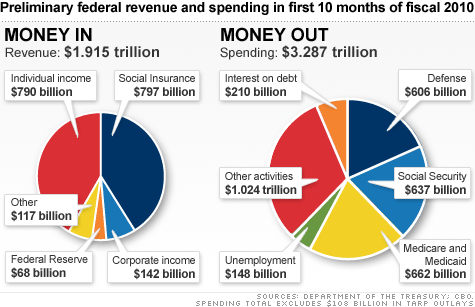Search News

NEW YORK (CNNMoney.com) -- Come Friday, the government will start a new fiscal year. But it will do so without a budget.
Instead, Congress is expected to vote this week on what it calls a continuing resolution, which is a band-aid solution that would make money available to keep the government operating until lawmakers return from their midterm election sprint across the hustings.
It won't be the first time that Uncle Sam has rung in a new fiscal year budget-free. In fact, tardy federal budgets have been par for the course for most of the past 35 years.
"It's pretty inexcusable even though we excuse it every year. There's no reason on earth why [lawmakers] shouldn't be able to make up their minds before the start of the fiscal year," said Rudolph Penner, a former Congressional Budget Office director who is now public policy scholar at at the Urban Institute.
Without a formal budget, Congress typically ends up passing continuing resolutions for a month or two at a time. That essentially prevents Washington from shutting down while lawmakers finalize how money will be allocated in the fiscal new year.
The resolution -- a "CR" in congressional lingo -- authorizes the heads of agencies like the FBI and FDIC to obligate money they need to carry out their agencies' work, whether through signing contracts, making purchases or hiring people.
It's hardly optimal, however. "It has implications for good government. Civil servants can't do their work very efficiently. It's hard to do rational planning," Penner said. (The same is true for businesses and individuals when Congress puts off making key tax decisions.)
Given the poisonous partisanship that has dominated this mid-term election year, it's easy to wonder if they can even pass a continuing resolution, the contents of which they are currently negotiating. If they don't, a government shutdown would be a real possibility.
But Penner believes a shutdown is unlikely because it would be deeply unpopular and both parties could suffer politically.
By the same token, Penner can envision a scenario where Congress doesn't finalize a formal budget until sometime after January. If the Republicans win the majority in the House, they may be unwilling to pass anything until they take over, he said.
While it's not unusual for Congress to ring in the new year without a budget in place, there's a somewhat new twist in the old procrastination dance this year.
That's because neither the House nor the Senate have even passed a formal budget resolution, which typically is done in the spring before the appropriations committees decide how to allocate federal funds.
The budget resolution sets caps for spending, establishes revenue targets and generally serves as a five- to 10-year blueprint of congressional priorities for the appropriations and tax committees to follow.
Nonetheless, lawmakers did some work on a budget this year. To date, the House has passed two of the 12 appropriations bills for 2011. The Senate hasn't passed any, but 11 of the 12 spending bills have been approved by the Appropriations Committee.
But it's a long way from the finish line for legislators. And there is still no consensus within or between the House and Senate on what the specific cap should be on discretionary spending for next year.
All told, the CBO estimates that the 2011 budget will total $3.7 trillion based on policies that were in place this summer. A little less than a third of that would go to discretionary spending and the rest would go to entitlement programs such as Medicare and interest on the country's debt.
And that debt is the elephant in the room in all budget discussions.
"No one wants to spell out what they would do given that the choices are humongous deficits or tough policy choices, all in an incredibly tense election year," said Maya MacGuineas, president of the bipartisan Committee for a Responsible Federal Budget. "The budget never really had a chance. And another sad truth -- most of the public will never even notice."
- Ted Barrett, CNN senior congressional producer, contributed to this article. ![]()






| Index | Last | Change | % Change |
|---|---|---|---|
| Dow | 32,627.97 | -234.33 | -0.71% |
| Nasdaq | 13,215.24 | 99.07 | 0.76% |
| S&P 500 | 3,913.10 | -2.36 | -0.06% |
| Treasuries | 1.73 | 0.00 | 0.12% |
| Company | Price | Change | % Change |
|---|---|---|---|
| Ford Motor Co | 8.29 | 0.05 | 0.61% |
| Advanced Micro Devic... | 54.59 | 0.70 | 1.30% |
| Cisco Systems Inc | 47.49 | -2.44 | -4.89% |
| General Electric Co | 13.00 | -0.16 | -1.22% |
| Kraft Heinz Co | 27.84 | -2.20 | -7.32% |
|
Bankrupt toy retailer tells bankruptcy court it is looking at possibly reviving the Toys 'R' Us and Babies 'R' Us brands. More |
Land O'Lakes CEO Beth Ford charts her career path, from her first job to becoming the first openly gay CEO at a Fortune 500 company in an interview with CNN's Boss Files. More |
Honda and General Motors are creating a new generation of fully autonomous vehicles. More |
In 1998, Ntsiki Biyela won a scholarship to study wine making. Now she's about to launch her own brand. More |
Whether you hedge inflation or look for a return that outpaces inflation, here's how to prepare. More |